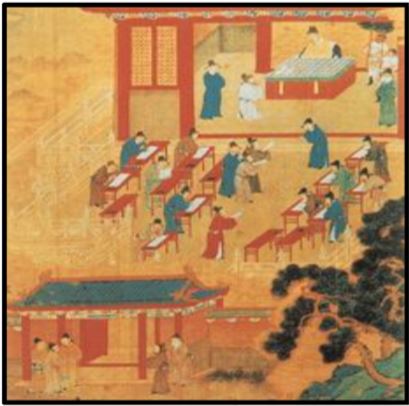China Han Dynasty Biography Activity
#4 Government Officials

Officials, played an important role in governing the vast Han empire. These officials were chosen because of their education, and received their power and authority from the emperor.
Officials began their education at an early age. Young people who went to school were first trained as scholars. In school they studied classical texts - including the writings of Confucius - mathematics, and the rules for correct social and political behavior. Most young people who attended school were boys, usually the sons of officials and other powerful families. When their education was complete, the young men took demanding exams to determine whether they could become officials. Many did not pass the tests. However, they often achieved other respectable jobs because of their education.
Women were never appointed to become officials and, as a rule, Han women were not as well educated as men. However, there were some outstanding women scholars. Most of them were the daughters of great scholars. These women sometimes served the government by writing and editing texts and essays, or they became teachers in the imperial court.
Han officials were arranged in as series of ranks. Two top officials of the central government were responsible for consulting with the emperor and helping him rule over the empire. Below these two officials were the senior officials who headed nine major offices of the state, or ministries, These officials, along with a few assistants, were responsible for overseeing the operation of the government and maintaining the imperial court.
One such senior official was the Grand Controller of Agriculture. He was responsible for collecting government income, or revenues, part of which was delivered in grain. His assistant supervised the upkeep of the state storage areas for grain, or granaries. They also arranged for the shipment of large amounts of grain to areas where it was most needed. Another senior official was the Keeper of the Imperial Purse. His ministry was responsible for preparing the emblems and badges needed by officials. He also supervised the craftspeople who built the finely made furnishings and equipment for the palace.
Most officials lived very comfortable lives. Many had servants and slaves to do their chores. The officials’ high status allowed them to acquire wealth in the form of land or money, or both. When senior officials traveled to the palace to meet with the emperor, they were often carried aloft in carriages. They dressed in their official robes and headdresses, and they wore special ribbons to show, or designate, their rank. The workplaces of many high officials resembled wealthy private homes. Many contained wide gateways, large courtyards, and shared apartments. These surroundings reminded visitors that they were in the presence of an important person whom they should pay respect.
Officials began their education at an early age. Young people who went to school were first trained as scholars. In school they studied classical texts - including the writings of Confucius - mathematics, and the rules for correct social and political behavior. Most young people who attended school were boys, usually the sons of officials and other powerful families. When their education was complete, the young men took demanding exams to determine whether they could become officials. Many did not pass the tests. However, they often achieved other respectable jobs because of their education.
Women were never appointed to become officials and, as a rule, Han women were not as well educated as men. However, there were some outstanding women scholars. Most of them were the daughters of great scholars. These women sometimes served the government by writing and editing texts and essays, or they became teachers in the imperial court.
Han officials were arranged in as series of ranks. Two top officials of the central government were responsible for consulting with the emperor and helping him rule over the empire. Below these two officials were the senior officials who headed nine major offices of the state, or ministries, These officials, along with a few assistants, were responsible for overseeing the operation of the government and maintaining the imperial court.
One such senior official was the Grand Controller of Agriculture. He was responsible for collecting government income, or revenues, part of which was delivered in grain. His assistant supervised the upkeep of the state storage areas for grain, or granaries. They also arranged for the shipment of large amounts of grain to areas where it was most needed. Another senior official was the Keeper of the Imperial Purse. His ministry was responsible for preparing the emblems and badges needed by officials. He also supervised the craftspeople who built the finely made furnishings and equipment for the palace.
Most officials lived very comfortable lives. Many had servants and slaves to do their chores. The officials’ high status allowed them to acquire wealth in the form of land or money, or both. When senior officials traveled to the palace to meet with the emperor, they were often carried aloft in carriages. They dressed in their official robes and headdresses, and they wore special ribbons to show, or designate, their rank. The workplaces of many high officials resembled wealthy private homes. Many contained wide gateways, large courtyards, and shared apartments. These surroundings reminded visitors that they were in the presence of an important person whom they should pay respect.
